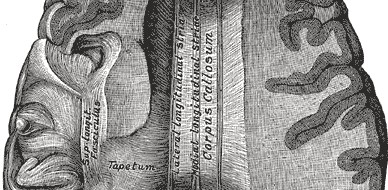Molly Hayman
UW Hospital
2025
Short story
His laughter rang in her ears.
She’d heard that laugh so many times throughout their years together and always thought of it as his special laugh. His real laugh. The sound he made when he thought something was actually funny.
This time though, she was fairly certain that real laugh had been at her.
She stared at her husband across their small, outdated kitchen. They had moved in with grand plans of renovating, but life happened. It didn’t bother her. The room was normally infused with the vibrant color of their children’s art and wafting aromas of her homemade food. At this moment, though, the fading beige walls and dirty, old oak cabinets felt like a damp blanket of suffocation.
He didn’t look at her. His eyes stayed on his phone. Why would he look at her now? His eyes hadn’t flicked up to acknowledge her when she came into the room to tell him the story. So why would he look at her now, when she needed him to?
She cocked her head to the side. No, now that it sat with her like an uninvited guest, she realized she had been wrong. The laugh that hung in the air now – the one she could feel like tendrils of anxiety twisting her gut – that laugh had a note of cruelty ringing behind it. It was like his real laugh but perverted, slowly rotted over time. When had cruelty infused him?
And now that she thought about it, she wasn’t sure when the last time was that she had heard his real laugh.
Laughter wasn’t hard to come by in their house; the kids laughed all the time. Peals of unbridled joy radiated off their son in high-pitched giggles as he zoomed about the house with the energy only a child could exude. Barely contained cackles of glee erupted from their daughter as she tried to keep up with him on her short, chunky toddler legs. Even the baby smiled and cooed with love in her eyes. The infant wasn’t quite laughing yet, but it wasn’t far off – a mother knew these things.
Even she had laughed fairly recently. Though at this precise moment, she couldn’t imagine it. It was hard not to, though, when the kids were goofy. They said ridiculous things and ended up in silly situations. Sure, maybe it wasn’t the same type of sound she had made in her twenties or early thirties, but then again, what she found funny had changed since then, too. It only made sense that her laugh had grown with her.
She had laughed just yesterday with the neighbor. He had been so kind, bringing their garbage cans in from the curb. She had asked her husband to do it, but he must have forgotten, so their neighbor had dragged them up the drive. She had popped outside to say thank you but he had waved her off, saying he knew how much they had going on. He had regaled her with a story of when his three children were young toddlers, still at home and making more mess than their garbage cans could handle. It had them both in tears of laughter and nostalgia.
But her husband.
When was the last time she heard his laugh?
She was brought back to reality by that bark of new laughter again. He was shaking his head while not looking at her.
The sound stung. Her skin prickled with betrayal.
Sure, her story was meant to be funny. Well, actually, she supposed it was objectively funny – stories about peeing oneself usually were. If she were being honest, though, she had been looking for sympathy, not laughter. She was hoping for a gentle hug and pat on the back – the simplest of human contact to assure her this was normal and her body wouldn’t always betray her. Maybe even a kiss to the temple, to remind her of everything her body had done for them, for the family.
But instead – laughter.
Real laughter.
Cruel laughter.
Laughter at her.
She didn’t move from the doorway. She couldn’t. She was now afraid of other ways her body might betray her. So she closed her eyes and took a beat of silence inside herself. That always helped to come back to herself. Her inner life was good and kind.
He hefted himself out of the kitchen chair, leaving his coffee cup at the table.
She felt safe enough to slide into the room now, making her way over the chair he had vacated.
He grabbed the coffee pot and shook it, indicating there was some left over for her, but she just sat quietly. His laugh had created a silence around her, a bubble of judgement she couldn’t seem to burst.
He sniffed and opened the tired cabinet above the pot to grab a mug. Sluicing the remaining coffee into a chipped mug which read “THE MOST MAGICAL PLACE ON EARTH” in faded, cursive script, he set it down with a clack in front of her.
“Don’t say I never did anything for ya.”
She stared at the coffee as he left the room. It was black. They had drunk coffee together for years. She liked her coffee with cream and sugar in it.
She liked the sweetness of it.
But this, this was bitter.
